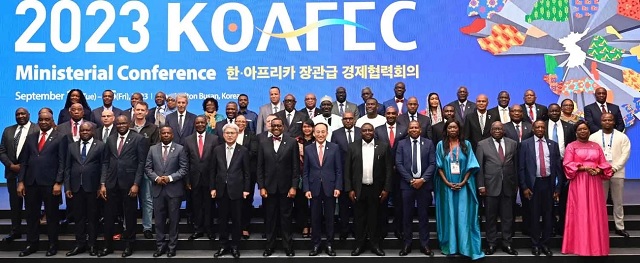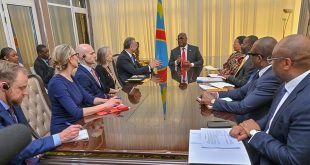
Seoul commits US$600 million to Africa’s energy, agriculture
Kampala, Uganda | RONALD MUSOKE | South Korea has injected US$600 million into the development of Africa’s energy and agricultural sectors as the call to have close to 600 million Africans get access to an electricity grid gathers pace across the continent.
The government of South Korea made the pledge on Sept. 13 at the just concluded Korea-Africa Economic Cooperation (KOAFEC) Ministerial Conference in the southern port city of Busan.
This year’s conference took place under the theme “Embracing a Sustainable Future: Just Energy Transition and Agricultural Transformation in Africa.” It shed light on the issues of low carbon energy transition and food security in Africa as well as Korea’s place in both areas.
The four-day conference (Sept.12-15), the seventh of its kind, was co-hosted by the African Development Bank Group, the South Korean Ministry of Economy and Finance, and the Export-Import Bank of Korea.
The conference came at a time when Africa is grappling with several challenges. Nearly 600 million people on the continent lack electricity in their homes. And despite rapid economic growth across the continent, hunger remains pervasive in some countries, affecting some 283 million people thanks to the devastating effects of climate change, the lingering effects of COVID-19 and the Russia-Ukraine war.
“As we meet, the world faces a number of challenges, including the tapering effects of the Covid-19 pandemic, eroded fiscal space for developing countries, heightened geopolitical risks from the Russia-Ukraine war and its effects on rising energy and commodity prices,” said Akinwumi Adesina, the President of the African Development Group.
“The tightening of monetary policies in Europe and the U.S. have led to rising interest rates that have in turn, led to capital flight from emerging markets and increasing debt service payments, especially for African countries, with many facing high risks of debt distress.”
Adesina told the delegates to seize the meeting as “a critical opportunity” to galvanize support for several objectives, including achieving universal energy access in Africa, advancing a just energy transition, and transforming the African continent into the breadbasket of the world.
Africa and climate change
The Busan meeting took place just a week after the continent converged in Nairobi for the Africa Climate Summit. During the Nairobi Summit, delegates heard how Africa accounts for only 3% of the global carbon emissions and yet it continues to suffer disproportionately from its effects, losing US$7–15 billion annually.
Climate finance experts say the losses could rise to US$50 billion by 2030. As such, Africa will need US$2.3 trillion to meet its Sustainable Development Goals (SDGs) by 2030. Among the continent’s major challenges will be how to push the 600 million Africans onto the electricity grid.
AfDB new energy deal
At the Busan conference, Adesina said although in 2016 the AfDB launched its New Deal on Energy for Africa, as the percentage of Africans with access to electricity increased from 35% to 56%, there is still much to do.
“In order to achieve universal access to electricity, we must add 90 million people annually by 2030. We must also add 130 million people annually to achieve universal access to clean cooking energy,” said Adesina.
He told the conference that the continent has enormous renewable energy potential, including 11 terawatts (11 million megawatts) of solar (the highest in the world) of which only one percent is utilised; 350 gigawatts (350,000 megawatts) of hydro of which only 7% is utilised; 115 gigawatts (115,000 megawatts) of wind potential of which only 2% is used; and 15 gigawatts (15,000megawatts) of geothermal power of which only 2% is utilised.
In order to reach universal access to electricity in Africa, Adesina said, it will require US$23 billion annually until 2030. On the other hand, achieving universal access to clean cooking energy will require US$2.5 billion per year through 2030, for investments in liquefied petroleum gas, biogas fuel, ethanol, electric plates, and improved biomass stoves.
According to analysis by the International Energy Agency, up to US$250 million worth of cooking equipment must be distributed across the continent by 2030. In response, Adesina noted that the AfDB is investing heavily in renewable energy, with the share of renewable energy in its power generation portfolio now standing at 87%.
“There is need to fully appreciate, however, that it will be impossible to provide universal access to electricity for Africa relying only on renewables,” he said, “This is because of their high intermittency and variability, which negatively affects reliability for industrial use.”
“As we think of a Just Energy transition, Africa must not be denied the opportunity to use its natural gas, which it now has in abundance from new discoveries. It will not add to the climate crisis. Rather, it will reduce emissions in Africa.”
“Let’s not forget that Africa’s share of cumulative global carbon emissions since 1890 has only been 3%. According to the International Energy Agency, if Africa were to use up all its natural gas supplies for gas-to-power it would only add 0.5% to total global emissions.”
He said if Africa used its natural gas combined with renewable energy that would assure Africa meets universal access to electricity, while assuring net zero emissions. He said AfDB is at the moment participating in the Just Energy Transition Partnerships in South Africa and Senegal (US$2.5 billion), with the EU, the US, the UK, Germany and France.
Adesina said, AfDB is also supporting efforts to develop more bankable projects, through its NEPAD Infrastructure Project Preparation Facility and Africa50. “That is why we have launched the Alliance for Green Infrastructure in Africa (AGIA), together with our partners, to mobilize US$500 million for project preparation on green infrastructure projects and mobilize US$10bn for infrastructure project investments.”
However, Adesina noted that most of the energy transition projects require a lot of resources. He said the anticipated re-allocation of the International Monetary Fund Special Drawing Rights (SDRs) to the AfDB was the key to attracting additional resources to develop Africa.
He urged South Korea to join other countries that have expressed strong interest in re-allocating SDRs to the African Development Bank Group. “This will be a game changer for Africa’s development,” he said.
Adesina described the Korea-Africa conference as a good opportunity to discuss progress on relations between Korea and Africa, development challenges and opportunities in Africa, and a chance for all parties to continue to work together to accelerate the growth and development of Africa.
Africa’s agricultural potential
On Africa’s agricultural potential, Adesina commended the Korean government for its K-Rice Belt initiative, which seeks to support eight African countries in producing 30 million tonnes of rice.
He said the initiative aligns with the African Development Bank’s Feed Africa strategy and the outcome of Dakar-2 Food Summit early this year. The Bank is intent on Africa achieving food self-sufficiency within five years.
The K-Rice belt project also has parallels with the African Development Bank’s flagship Technologies for African Agricultural Transformation (TAAT) programme. The TAAT Rice Compact continues to collaborate with the Korea-Africa Food and Agriculture Cooperation Initiative (KAFACI) through AfricaRice. TAAT supports KAFACI’s network of 13 African countries through workshops, joint planning, and regular interaction.
“This presents an excellent opportunity for Korea to work together with the African Development Bank on a pan-African rice production initiative,” the Bank president said.
“Africa must be a solution to feeding the world, as it has 65% of the uncultivated arable land left in the world,” he told delegates, adding: “What Africa does with agriculture will therefore determine the future of food in the world.”
The AfDB is also preparing a regional operation to finance the Regional Rice Resilient Value Chains Development (REWARD) programme in West Africa. Through this programme, the Bank will provide US$650 million to the 15-member countries of the Economic Community of West African States (ECOWAS).
REWARD targets double cropping and yields on 750,000 hectares of irrigated land. One million rice farmers will benefit, and 30% of these farmers are women. The initiative will push total paddy production to 10.5 million tonnes per year or 53 million tonnes by the end of the five-year programme in 2028.
Dr. Hwang-yong Kim, the Director General of Technology Cooperation Bureau, Korea Rural Development Administration, said there was every reason for confidence that African countries could emulate Korea’s successful development trajectory.
Kim noted how in the 1960s, after the Korean War, the country was one of the poorest nations in the world. He said Korea even received assistance from some African countries. However, thanks to its transformative agriculture, South Korea has since become one of the largest economies in the world.
Kyungho Choo, South Korea’s Deputy Prime Minister and Minister of Economy and Finance, emphasized the crucial role that Korea and Africa must play. He highlighted Korea’s strength in high-tech industry and innovative technology.
“If advanced tech industry of Korea and the growth potential of Africa are combined, it will be powerful solidarity that will lead to the recovery of the world,” Finance Minister, Choo said in his opening speech during a round table meeting on Sept. 13.
Choo pointed out the escalated uncertainty of the world economy following the pandemic, slow economic growth and the expansion of protectionism are holding back the growth of both Korea and Africa.
But he was also quick to point to the great many opportunities that Africa offered as the world’s future market and industrial base with a vibrant young population.
“Together, our two worlds can become the most solid rock of solidarity,” he told the meeting which included 33 African finance ministers, ambassadors, heads of Pan-African institutions and NGOs, CEOs as well as South Korean private sector leaders. He stressed the need for Africa and Korea to strengthen cooperation.
Choo summarized South Korea’s priority areas for support to Africa as “ABC”—agriculture, bio-health, and climate change, as well as energy transition. He said Korea also planned to significantly increase its official development assistance.
Choo said that in cooperation with the AfDB, South Korea supported energy projects for Africa’s sustainable development. “We are also working to support Africa’s growth as outlined in the African Development Bank’s High 5s development priorities,” Choo said. “As a true partner, Korea will continue to support Africa’s development.”
 The Independent Uganda: You get the Truth we Pay the Price
The Independent Uganda: You get the Truth we Pay the Price



